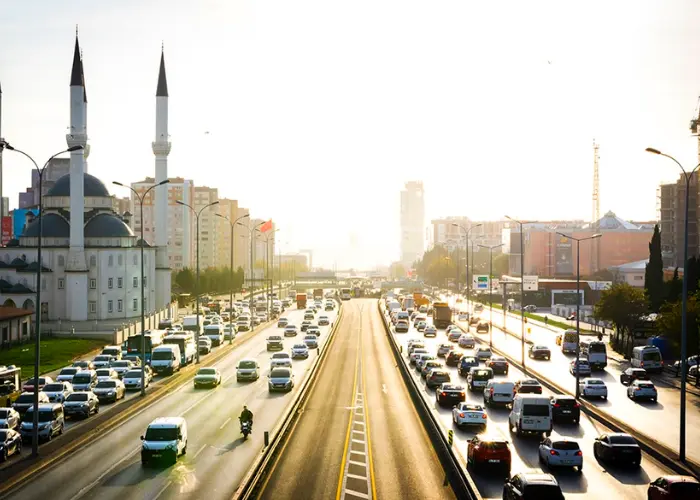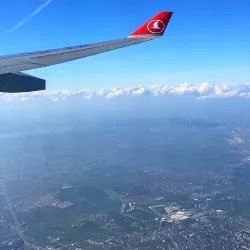Turkey is best explored by car. Even though it's difficult in Istanbul, it's worth a try because your own car is the most comfortable alternative. Here, we have listed some of the most important things you should keep in mind before you hit the beautiful roads of Turkey. Since every single tip and rule, we have listed applies to Istanbul as well, we have provided more general information. Some things to remember before driving in Turkey.
1 - Understand Turkey's HGS toll system
Turkey's current highway infrastructure was recently converted to a High-Speed Toll System nicknamed HGS. A car-mounted electronic device collects the toll as you pass through toll gates. All cars must have HGS, thus your rental car business should provide it. Follow the HGS lanes and decelerate to 30km/h through the tollbooths. This automatically collects the toll, which your rental car company will bill you for.
2 - Avoid Old Town Narrow Lanes
Motorways benefit from Turkey's infrastructure spree, but historic town alleys do not. Here, decaying charm, potholes, and stalls flow onto small streets. Tight, steep lanes made of missing paving stones. Double-parked cars block roads, streets become one-way overnight, and pedestrians ignore safety. If possible, park outside the old town.
3 – Don’t Pull too Close up to Traffic Lights
In Turkey, you have 0.2 seconds to react before cars behind you start beeping. After a few days of driving in Turkey, I realized my poor reaction time wasn't due to impatience. Too far ahead at a junction, you can't see the traffic lights behind you. This weakness in Turkey's municipal planning is well-known to Turks, who will hornily tell you to go. When driving in Turkey, check the traffic signals before stopping at a crossroads.
4- Know the Limits
Throughout our vacation, Turkey's speed limits mystified us. No speed signs sometimes. Sometimes we went 70, 50, and 30km/h in 100m. Often, a major highway's speed drops to 50km/h for a little crossroads and never changes. We observed 82 km/h speed limits in a few locations, which we liked for their precision but didn't understand. Turkey's speed limits must be looked up. Voilà. Highways and motorways are 120 km/h, double-lane roads are 90 km/h, and built-up areas are 50 km/h. In Turkey, the BAC limit is zero.
5- Not All Roundabouts are Actually Roundabouts
A Turkish crossroads looks like a roundabout but isn't one. It's a circle in the center of a large intersection where left-turning autos halt for approaching traffic. Oncoming cars don't need to stop (or even slow down) because the "roundabout" doesn't block their lanes. If you treat it like a typical roundabout, you'll soon realize automobiles won't give way for you. Double-lane roundabouts require extra vigilance.
6 – Check For Hotel Parking
Except in a few large cities, parking wasn't a problem for us in Turkey. Most towns had easy street parking. Many hotels feature parking, but those near town centers may have limited space. Sometimes hotel parking meant leaving your keys with the staff so they could move your car as needed.

7 - Leaving Your Car Keys at Otopark is Not Waving Goodbye to Your Vehicle.
Easy parking at key attractions. All attractions offer free or $5-$10 Turkish Lira parking. Some smaller sites offered to watch our automobile. A polite "no thanks" will do. Turkey doesn't have parking meters. Someone will take money if you park in a paid location. We parked in car parks in bigger towns (Oto Parks). In many Oto Parks, you must leave your keys with the attendant since they sardine-pack the cars. Our automobile was always there when we returned. Oto Parks costs 28-40 Turkish Lira per hour.
8- Trust Google Maps 100% (Up to a Certain Point)
Turkey's navigation is easy. Modern roads have good signage, especially for key attractions. Major tourist destinations are identified with brown signs. Google maps were great for navigating. Google sometimes took us off the main highway and into smaller backroads to find the most efficient route. If Google Maps directs you off major roads when signs to your destination point another way, follow the signs.
9– Download Google Maps when WiFi is good
We rarely acquire a SIM card in a new country because even the cheapest hotels have strong WIFI (plus cafés, restaurants, and museums). We were alright without WIFI when driving around Turkey. Yet. Only while driving could it have been a concern. We always downloaded Google Maps for the next day's travel. So we had directions to our location.
10- Understanding Turkey's High-quality Service Stations
Even on desolate highways, Turkey has gleaming new gas stations. The food at Turkish gas stations is very good. This is quality cuisine at reasonable pricing, not trash. They have clean restrooms, too. In Turkey, you can't fuel your own car. To turn on a pump, an attendant must press buttons and wave a keycard. He'll fill it. All gas station personnel know "full." To get less, write it down.
11 – Know Hire Car Details Before You Go
When we picked up our rental car in Istanbul, the employees didn't have our booking details and quoted us four different costs in an hour. Bring all your documentation and know what you've paid for upfront. Remember you're on vacation. At 48 Turkish Lira a day, we thought additional insurance was worth it. Car rental firms charge extra for pick-up and drop-off in different locations. These fees aren't bad in Turkey. 250 TL from Istanbul to Antalya.
12– Stay Further Back Than Usual
Turkey has unstable drivers. Cars wander into your lane or pull out in front of you extremely rarely. The hard shoulder is commonly used as a substitute lane when overtaking. Slow-moving tractors and other vehicles cruise the roadways, as others zoom by. Give the car in front of you plenty of leeway for risky moves.
13- English is Your Friend
Like other countries, Turks adore it when you speak their language. If the police pull you over, don't try to speak Turkish. Police checkpoints are typical in Turkey, but we were waved on with a "hi, how are you?" in our best English voices. We often witnessed cops at town entrances randomly stopping cars. On the motorway, they have cardboard police cars warning against speeding. No issue. Police were either nice or uninterested in tourists.
Should you drive in Turkey?
Big cities don't need cars, but the countryside does. The roads are well-maintained and well-signed. Easy parking and lots of gas stations. Turkey's public transport is largely for locals, not tourists. If you want to visit out-of-the-way places, rent a car. Having a car lets you choose what to see and for how long. The vista from the automobile window in Turkey is beautiful. Stopping to take shots whenever you want is fun. We noticed tour groups waiting at gift shops or tourist-oriented restaurants. Driving in Turkey isn't too expensive, making it a smart and affordable option.
Renting a Car in Turkey
-
Car rental is difficult. Many companies provide multiple add-ons and insurance levels, making it hard to compare pricing and know what you've bought.
-
You should also keep in mind that Turkey is a right-hand drive.
-
Tourists can drive in Turkey, however, the automobile rental age is 21.
-
Foreign licenses are valid for 6 months in Turkey. Visitors from various countries may also need an International Driving Permit.
-
Turkey has a 0 BAC limit, thus you can't drink and drive.
-
To generalize, urban areas are 50km/h, double-lane roads are 90km/h, and motorways are 120km/h. But check for road signs.
-
Drive with all your documents. Regular police stop, especially on tourism highways, requires papers.
-
While the minimum driving age in Turkey is 18, automobile rental firms need 21.
Frequently Asked Question
Can I use a rented car outside Turkey?
Most car rental companies do not allow rental cars to be driven outside Turkey.
Where can I rent a car in Istanbul after I landed?
Most of the rental companies locate rental car depots close to the airports so that you will not have to deal with finding one.
Do I need a driver’s license to rent a car in Turkey?
Yes. To rent a car in Turkey, you need to have a driver’s license for at least a year.
What side of the road do I drive in Turkey?
The traffic flows from the right side of the road in Turkey. The driver’s seat is on the left of the car.
Do I need an international license to drive in Turkey?
You do not have to have an international license. As long as your driver’s license is valid in your country, you are not likely to encounter a problem with driving in Turkey.
 English
English  Indonesian
Indonesian  Urdu
Urdu  Taiwanese
Taiwanese  Russian
Russian  Romanian
Romanian  Portuguese
Portuguese  Persian
Persian  Macedonian
Macedonian  Korean
Korean  Japanese
Japanese  Italian
Italian  Indian
Indian  Hungarian
Hungarian  Greek
Greek  German
German  Croatian
Croatian  Chinese
Chinese  Bulgarian
Bulgarian  Arabic
Arabic  French
French  Spanish
Spanish 




